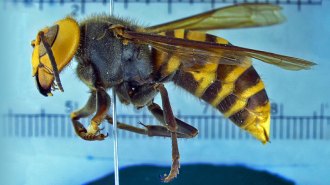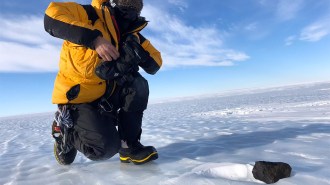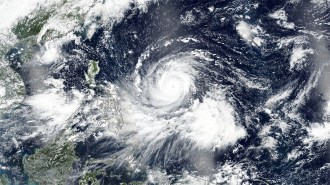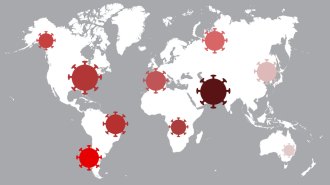Uncategorized
-
 Life
LifeMore ‘murder hornets’ are turning up. Here’s what you need to know
Two more specimens of the world’s largest hornet have just been found in North America.
By Susan Milius -
 Genetics
GeneticsGenetic risk factors for Alzheimer’s also raise the risk of getting COVID-19
People who have the APOE4 genetic variant appear to be more vulnerable to the disease, but it’s unclear why.
-
 Life
LifeNeon colors may help some corals stage a comeback from bleaching
When some corals bleach, they turn bright colors. Stunning hues may be part of a response that helps the corals recover and reunite with their algae.
-
 Planetary Science
Planetary ScienceMeteorites might be more likely to strike near the equator
Meteorites from Antarctica have helped scientists assess the total number likely to hit Earth every year — and where they are most likely to fall.
By Shannon Hall -
 Archaeology
ArchaeologyA biblical-era Israeli shrine shows signs of the earliest ritual use of marijuana
Chemical analyses reveal a residue of cannabis and animal dung on an altar from a biblical-era fortress in use more than 2,700 years ago.
By Bruce Bower -
 Climate
ClimateHow more powerful Pacific cyclones may be fueling global warming
Increasingly strong storms in the North Pacific may be speeding up the fast-moving Kuroshio Current — which could bring more heat to high latitudes.
-
 Health & Medicine
Health & MedicineWastewater could provide up to a week of warning for a COVID-19 spike
A new study adds to evidence that sewage may serve as an early warning signal that the coronavirus has hit a community.
-
 Space
SpaceSpaceX’s astronaut launch marks a milestone for commercial spaceflight
Two NASA astronauts aboard the privately built Crew Dragon capsule are the first to be sent into orbit from U.S. soil since 2011.
-
 Space
SpaceHalf the universe’s ordinary matter was missing — and may have been found
Astronomers have used fast radio bursts as cosmic weigh stations to tease out where the universe’s “missing matter” resides.
-
 Health & Medicine
Health & MedicineInfecting people with COVID-19 could speed vaccine trials. Is it worth it?
To accelerate vaccine development, some experts argue we should purposefully infect volunteers with the coronavirus. Others warn of the risks.
-
 Health & Medicine
Health & MedicineIs the coronavirus mutating? Yes. But here’s why you don’t need to panic
Some studies claim there are new strains of the coronavirus, but lab experiments are needed to see if mutations are changing how it infects cells.
-
 Physics
PhysicsA star shredded by a black hole may have spit out an extremely energetic neutrino
A star’s fatal encounter with a black hole might have produced a neutrino with oomph.